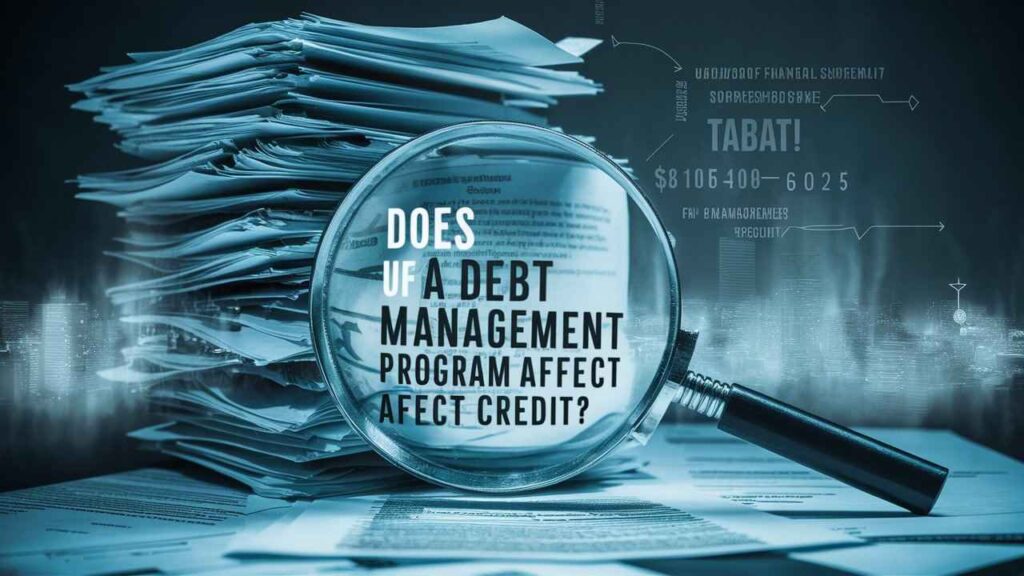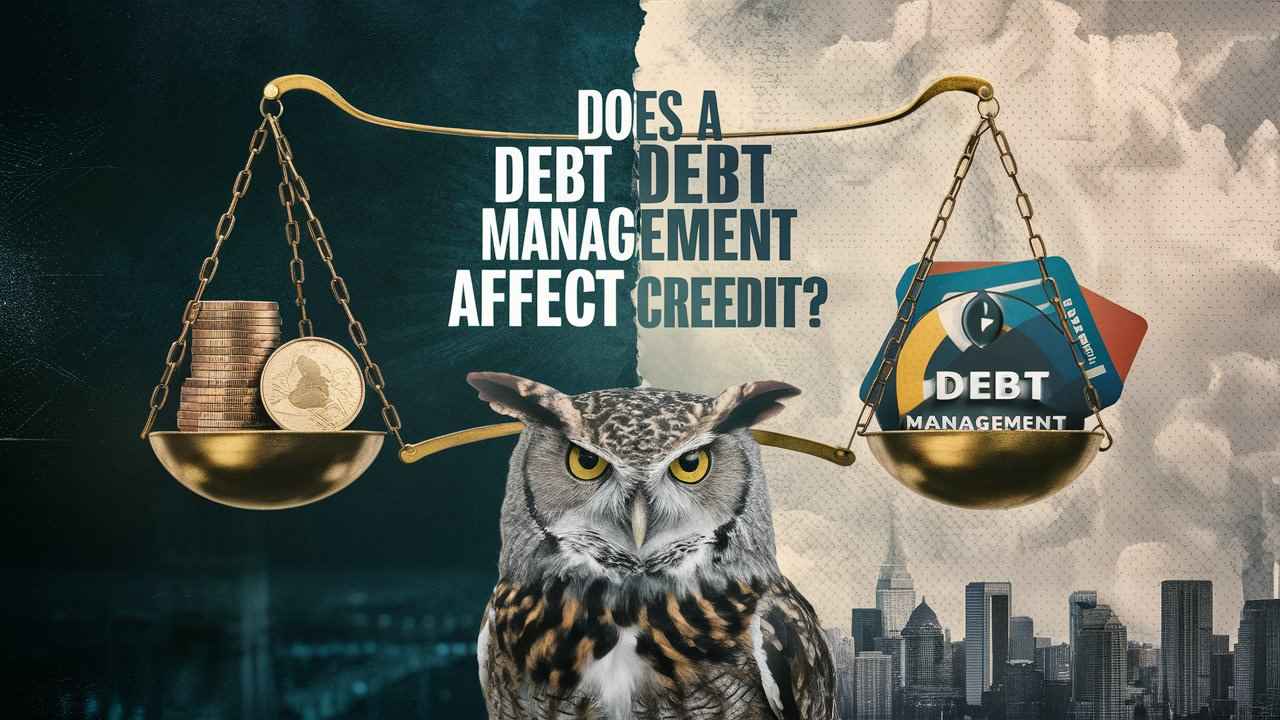What is a Debt Management Program, and Why Should You Care?
A Debt Management Program (DMP) is not just a buzzword in the world of personal finance; it’s a lifeline for those drowning in a sea of overdue bills. This structured plan, often overseen by credit counseling agencies, helps individuals consolidate their unsecured debts🤑like credit card balances🤑into a single, manageable monthly payment. Why should you care? Because it offers a chance to escape the chaos of spiraling debt without declaring financial defeat through bankruptcy.

The Burning Question: Does it Really Affect Credit?
Now for the biggie: does enrolling in a Debt Management Program leave your credit score glowing or gasping for air? The answer isn’t black and white, but don’t worry🤑we’re about to break it all down with a mix of wit and wisdom.
TAKING in Debt Management Programs
Breaking Down the Basics: What Does a Debt Management Program Do?
At its core, a Debt Management Program negotiates lower interest rates and more forgiving payment terms with your creditors. It bundles your debts into one neat package, like Marie Kondo for your finances, and aims to help you pay off everything within three to five years.
Who Typically Enrolls in These Programs?
DMPs are not one-size-fits-all. They’re most beneficial for those with high-interest credit card debt who are overwhelmed but still have a steady income. If you’ve ever found yourself asking, “Why does payday never align with my bills?”🤑you might be the perfect candidate.
The Key Differences Between Debt Management and Debt Settlement
Don’t confuse a Debt Management Program with debt settlement. The latter involves negotiating with creditors to pay less than you owe, which can devastate your credit score. DMPs, on the other hand, are more like a diet plan: disciplined and designed to make you healthier over time, rather than a crash diet that leaves you weaker.

How Credit Scores Work
Credit Scores 101: The Magic Behind the Numbers
Your credit score is like a financial report card. It’s a three-digit number that tells lenders whether you’re reliable or risky. Ranging from 300 to 850, it’s calculated based on factors like payment history, amounts owed, and the length of your credit history.
Factors That Impact Your Credit Score (Hint: It’s More Than Just Debt)
Late payments, maxed-out credit cards, and hard inquiries can send your score into a tailspin. But did you know that even opening or closing accounts affects it? This intricate web of factors makes managing credit a delicate balancing act.
Why Credit Scores Matter for Your Financial Health
A good credit score unlocks low-interest loans, premium credit cards, and even better rates on insurance. Think of it as your golden ticket to financial opportunities.

The Relationship Between Debt Management Programs and Credit
The Immediate Impact on Your Credit Report
Enrolling in a Debt Management Program might show up on your credit report, depending on the agency you work with. While this isn’t inherently negative, some lenders may view it as a sign you’re struggling to manage your finances.
How Payment History Plays a Role in the Equation
Payment history makes up 35% of your credit score. A Debt Management Program ensures you stay current on payments, which can prevent further damage to your score.
Credit Utilization: Does It Go Up or Down?
By paying down balances through a DMP, your credit utilization rate🤑a key scoring factor🤑will gradually improve. However, any closed accounts could momentarily skew the numbers.
The Myth of Closing Credit Cards and Its Effect on Credit
Closing credit cards during a Debt Management Program may reduce your available credit and shorten your credit history, both of which can ding your score.

Short-Term Credit Impacts
How Signing Up for a Program Might Trigger a Credit Score Drop
Enrolling in a Debt Management Program may result in an initial dip in your credit score due to changes in account statuses or creditor reports.
The Role of Credit Counseling Agencies in Reporting to Credit Bureaus
Some agencies report participation in DMPs to credit bureaus, which can be a double-edged sword. Transparency is key🤑ask about their policies upfront.
The Emotional Toll: Coping with a Lower Score
A temporarily lower score can sting, but remember, this is a marathon, not a sprint. Focus on the long-term benefits rather than short-term frustrations.

Long-Term Credit Benefits
How Debt Management Programs Can Help You Build Better Credit Habits
A Debt Management Program isn’t just about paying off debt; it’s about relearning how to manage money responsibly.
Why Paying Off Debt Could Be the Ultimate Score Booster
Reducing debt balances lowers your credit utilization rate, which is a significant factor in boosting your score over time.
Rebuilding Your Credit After Completing a Program
Once you’re debt-free, focus on rebuilding your credit by keeping balances low, paying bills on time, and using credit wisely.
Pros and Cons of Debt Management Programs
The Upside: A Path to Financial Freedom
Lower interest rates, consolidated payments, and a clear path to being debt-free🤑what’s not to love?
The Downside: Is the Credit Impact Worth It?
Temporary credit score dips and potential account closures are worth considering before enrolling in a DMP.
Alternative Options: Are There Better Ways to Handle Debt?
Explore alternatives like balance transfers, personal loans, or DIY strategies before committing to a Debt Management Program.
Tips for Protecting Your Credit During a Debt Management Program
Communicating with Creditors: Your Secret Weapon
Maintain open lines of communication with creditors to avoid surprises. Proactivity pays dividends.
Monitoring Your Credit Score While Enrolled
Keep an eye on your credit score through apps like Credit Karma or Experian, and celebrate incremental improvements.
How to Avoid Scams and Choose a Reputable Program
Work with trusted agencies like NFCC or FCAA members to ensure you’re not falling for predatory schemes.
Conclusion
Does a Debt Management Program Affect Credit? The Final Verdict
Yes, a Debt Management Program affects credit, but often in ways that are ultimately positive if managed correctly.
Steps to Take Before Signing Up for a Program
Evaluate your financial situation, research programs, and consult with a reputable credit counseling agency.
Building a Financial Future Without Fear of Credit Scores
A Debt Management Program is a tool, not a trap. Use it wisely, and you’ll emerge stronger, savvier, and ready to take on the financial world.
People Also Ask
What are the benefits of a DMP?
- Consolidated monthly payments simplify debt repayment.
- Reduced interest rates and waived fees save money.
- Creditors often stop collection calls and legal actions.
- Helps individuals regain control of their finances without declaring bankruptcy.
- Encourages consistent payment habits, potentially improving credit scores over time.
What is debt management and how does it work?
Debt management involves creating a structured plan to repay debts efficiently. It often includes negotiating with creditors to reduce interest rates or waive fees. Individuals make a single monthly payment to a credit counseling agency, which distributes the funds to creditors.
What is debt management software?
Debt management software is a digital tool designed to help individuals or agencies track, organize, and manage debts. It includes features for budgeting, payment scheduling, and generating reports to monitor progress.
What is program debt?
Program debt refers to financial obligations accumulated under specific financing or service programs. Examples include loans offered by government or private entities for education, business, or housing.
What is an advantage of a debt management plan?
An advantage of a DMP is its ability to reduce financial stress by consolidating payments and potentially lowering interest rates and fees, making debt repayment more manageable.
What is DMP used for?
A Debt Management Program (DMP) is used to help individuals repay unsecured debts such as credit cards, medical bills, and personal loans in an organized and affordable way.
How does DMP work?
A credit counselor evaluates the individual’s finances and negotiates with creditors for reduced interest rates or fees. The individual makes one monthly payment to the counseling agency, which then distributes the funds to creditors.
What are the risks of DMP?
- Accounts are often closed, affecting credit history.
- Failure to complete the program may result in financial penalties.
- Some agencies charge high fees, reducing cost-effectiveness.
- Creditors are not obligated to participate or honor agreements.
What is a DMP in banking?
In banking, a DMP is a program designed to help customers manage their unsecured debts by consolidating payments and potentially reducing interest rates, often administered through partnerships with credit counseling agencies.
What are the disadvantages of debt management?
- Limited to unsecured debts, excluding mortgages or car loans.
- May negatively impact credit scores initially.
- Requires strict adherence to a payment plan.
- Not all creditors may agree to participate.
Who is the best debt management company?
The best debt management company depends on individual needs, but reputable organizations include National Debt Relief, GreenPath Financial Wellness, and Money Management International. Research and check for accreditations before choosing.
How is debt managed?
Debt is managed through budgeting, prioritizing repayment of high-interest debts, consolidating payments, negotiating with creditors, and using financial tools or counseling services for assistance.
What is a debt tool?
A debt tool is any resource or system designed to aid in managing and reducing debt. Examples include budgeting apps, debt calculators, and debt management software.
What is private debt management?
Private debt management refers to managing debts through non-governmental means, often using the services of private companies, financial advisors, or personal strategies to repay obligations.
How to manage debts?
- Create a detailed budget.
- Prioritize high-interest debts.
- Explore consolidation or refinancing options.
- Negotiate with creditors for better terms.
- Seek professional help if needed, such as credit counseling.
What program is DMP?
A DMP is a structured debt repayment program offered by credit counseling agencies to help individuals consolidate and repay unsecured debts.
What is the meaning of debt management?
Debt management refers to strategies and practices for handling debts effectively, ensuring timely repayment, and minimizing financial strain.
Which debt strategy is best?
The best strategy varies based on individual circumstances. Popular strategies include the debt snowball method (paying off smaller debts first) and the debt avalanche method (prioritizing high-interest debts).
What is the debt management plan used for?
A debt management plan is used to simplify debt repayment, reduce financial strain, and ensure consistent payments to creditors by consolidating debts into one monthly payment.
How does debt work?
Debt is a financial obligation where an individual borrows money and agrees to repay it with interest or under specific terms. Proper management involves timely repayment to avoid penalties and credit score damage.
What is the benefit of DMP?
The primary benefit of a DMP is its ability to simplify debt repayment while potentially reducing interest rates and fees, making the process more manageable and less stressful.









